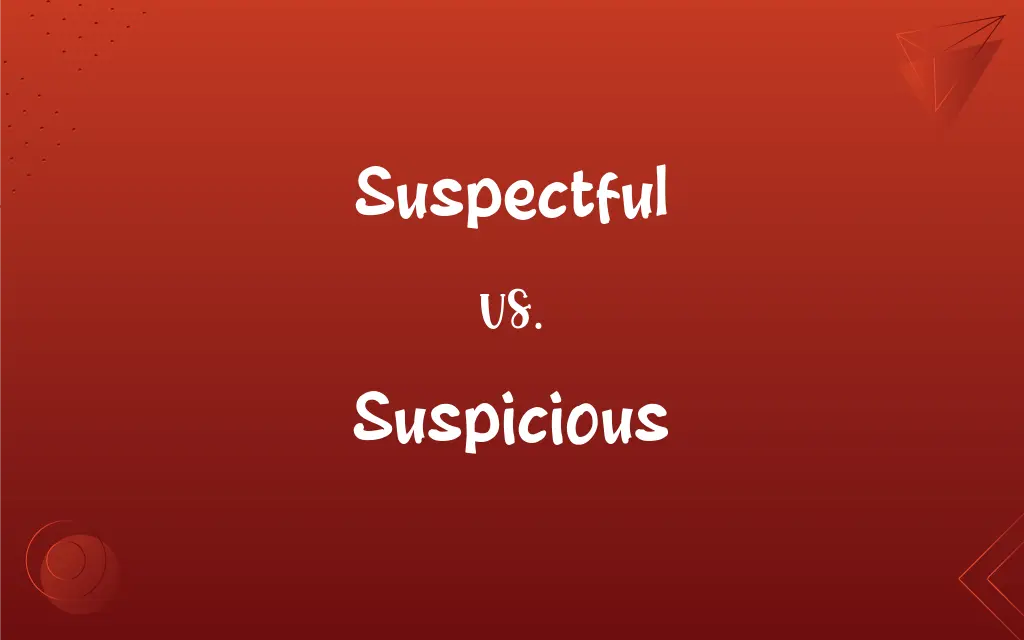Suspectful vs. Suspicious: What's the Difference?
By Harlon Moss || Updated on May 24, 2024
Suspectful means being full of suspicion or having a tendency to suspect, whereas suspicious means having or showing a cautious distrust of someone or something.

Key Differences
Suspectful refers to a tendency to be inclined towards suspicion or doubt. A suspectful person often feels that something might be wrong or that someone might be untrustworthy without concrete evidence. Suspicious, on the other hand, directly describes the state of feeling or showing distrust. A person who is suspicious exhibits a clear sense of caution and skepticism towards someone or something.
Suspectful is an uncommon term that implies a general disposition or tendency to be suspicious. It is not frequently used in modern English but can describe a habitual state of mind where one is inclined to suspect others. Suspicious is a commonly used term that describes a specific reaction or behavior. When someone is suspicious, they are actively expressing or feeling distrust.
In practical use, suspicious is much more prevalent and is used to describe both situations and individuals. For example, a suspicious activity or a suspicious person suggests something that seems wrong or out of place and warrants further investigation. Suspectful is rarely used and might be found more in literary contexts to convey a general inclination towards suspicion.
From a grammatical perspective, both terms function as adjectives, but suspicious is more versatile and widely understood. Suspicious can modify a wide range of nouns (suspicious behavior, suspicious package), while suspectful is mostly limited to describing people and their tendencies.
Comparison Chart
Definition
Having a tendency to be suspicious or doubtful
Having or showing cautious distrust
ADVERTISEMENT
Usage Frequency
Rarely used, more literary
Commonly used in everyday language
Application
Describes a general disposition
Describes a specific feeling or reaction
Examples
"A suspectful nature"
"Suspicious behavior", "A suspicious person"
Grammatical Role
Adjective, limited application
Adjective, versatile application
Suspectful and Suspicious Definitions
Suspectful
Having a tendency towards suspicion.
She was always suspectful of others' intentions.
ADVERTISEMENT
Suspicious
Indicative of or feeling suspicion.
Her sudden change in behavior was highly suspicious.
Suspectful
Full of suspicion or mistrust.
The detective's suspectful gaze surveyed the room.
Suspicious
Characterized by a lack of trust.
He gave a suspicious look when asked about his whereabouts.
Suspectful
Inclined to suspect or doubt.
His suspectful nature made him wary of strangers.
Suspicious
Having or showing a cautious distrust.
The police became suspicious of his activities.
Suspectful
Rarely used term indicating habitual suspicion.
Living in a suspectful state, he trusted no one.
Suspicious
Wary or distrustful of someone or something.
They were suspicious of the new neighbor's intentions.
Suspectful
Prone to suspecting something without evidence.
His suspectful attitude often led to misunderstandings.
Suspicious
Arousing or likely to arouse suspicion.
The package left on the doorstep looked suspicious.
Suspectful
Mistrustful, suspicious.
Suspicious
Arousing or apt to arouse suspicion; questionable
Suspicious behavior.
Suspectful
Apt to suspect or mistrust; full of suspicion; suspicious; as, to be suspectful of the motives of others.
Suspicious
Tending to suspect; distrustful
A suspicious nature.
Suspicious
Expressing suspicion
A suspicious look.
Suspicious
Arousing suspicion.
His suspicious behaviour brought him to the attention of the police.
Suspicious
Distrustful or tending to suspect.
I have a suspicious attitude to get-rich-quick schemes.
Suspicious
Expressing suspicion
She gave me a suspicious look.
Suspicious
Inclined to suspect; given or prone to suspicion; apt to imagine without proof.
Nature itself, after it has done an injury, will ever be suspicious; and no man can love the person he suspects.
Many mischievous insects are daily at work to make men of merit suspicious of each other.
Suspicious
Indicating suspicion, mistrust, or fear.
We have a suspicious, fearful, constrained countenance.
Suspicious
Liable to suspicion; adapted to raise suspicion; giving reason to imagine ill; questionable; as, an author of suspicious innovations; suspicious circumstances.
I spy a black, suspicious, threatening could.
Suspicious
Openly distrustful and unwilling to confide
Suspicious
Not as expected;
There was something fishy about the accident
Up to some funny business
Some definitely queer goings-on
A shady deal
Her motives were suspect
Suspicious behavior
FAQs
Is suspectful commonly used?
No, suspectful is a rarely used term in modern English.
What does suspectful mean?
Suspectful means having a tendency to be suspicious or doubtful.
What does suspicious mean?
Suspicious means having or showing cautious distrust of someone or something.
Can suspectful describe situations?
No, suspectful typically describes a person's tendency towards suspicion.
What is an example of suspicious in a sentence?
"The police became suspicious of his activities."
What is the grammatical role of suspicious?
Suspicious functions as an adjective and is used broadly.
Can suspicious describe situations?
Yes, suspicious can describe both situations and individuals (e.g., suspicious behavior).
Is suspicious more versatile than suspectful?
Yes, suspicious is more versatile and widely understood.
Is suspicious commonly used?
Yes, suspicious is commonly used to describe feelings or behaviors of distrust.
What is an example of suspectful in a sentence?
"His suspectful nature made him wary of strangers."
Does suspectful imply habitual suspicion?
Yes, suspectful implies a general or habitual tendency to be suspicious.
Which term is more widely recognized?
Suspicious is more widely recognized and used.
Can suspectful and suspicious be used interchangeably?
No, they cannot always be used interchangeably due to different connotations and usage frequencies.
Can you use suspicious to describe an object?
Yes, you can describe objects as suspicious (e.g., a suspicious package).
Is suspicious used in everyday language?
Yes, suspicious is commonly used in everyday language.
What is a common context for using suspicious?
Suspicious is often used in contexts involving potential wrongdoing or unusual behavior.
Is suspectful found in literary contexts?
Yes, suspectful might be found more in literary contexts.
Does suspicious imply active distrust?
Yes, suspicious implies an active state of distrust or caution.
What is the grammatical role of suspectful?
Suspectful functions as an adjective with limited application.
Can you use suspectful to describe an object?
No, suspectful is typically used to describe a person's disposition.
About Author
Written by
Harlon MossHarlon is a seasoned quality moderator and accomplished content writer for Difference Wiki. An alumnus of the prestigious University of California, he earned his degree in Computer Science. Leveraging his academic background, Harlon brings a meticulous and informed perspective to his work, ensuring content accuracy and excellence.































































